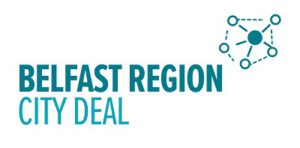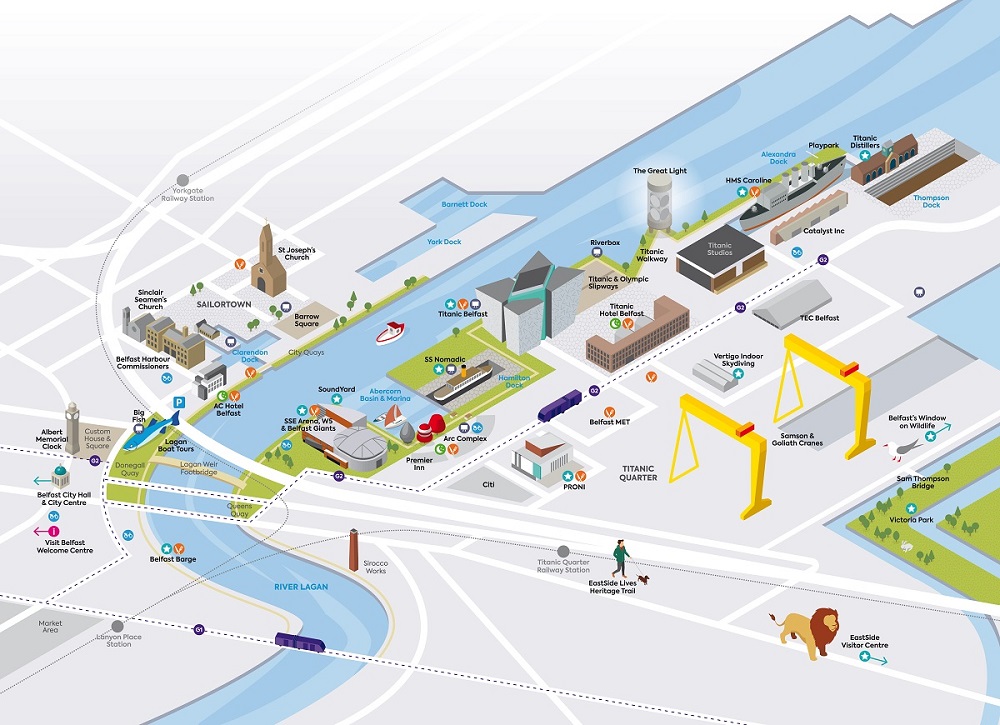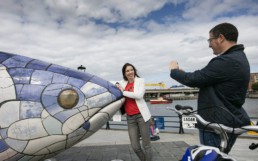Clarification questions - 2025 5G Funding Competition
Page updated: 29 August 2025
Below are clarification questions received about the Belfast 5G Innovation Region funding competition. Email your questions to innovationfunding@belfastcity.gov.uk before 5pm, 27 August 2025.
Clarification questions and answers will be published on this page. Any commercially sensitive or personal information will be removed before publishing.
1. The guidance states that RTOs can apply – can you confirm if this would be individually or as part of a consortium?
A single business or organisation must apply to the competition and, if successful, Belfast City Council will sign a Grand Funding Agreement with the single lead applicant only. The lead applicant can have a range of partners and suppliers, so an RTO may submit an application itself, or may be part of another organisation’s application.
2. Can a university be the lead applicant?
Yes.
3. The statement “testbeds, trials and research will not be funded” – could you please define what is meant by trials in this context? I believe most projects will involve some form of trial or testing.
Trials refers to the research and development stage of the technical solution. The grant funding must be used for the implementation of existing technology solutions and products to enable 5G/advanced wireless use cases. The funding cannot be used for product development, research and development activities, or associated trials or testbeds. The funding can be used for pilots, where an existing solution is tested to assess whether it is suitable for supporting operational use in a specific live environment. For example, on one of a number of production lines or at one of several sites. Such a pilot or “trial” is acceptable.
4. The scheme outline specifies 5G or other advanced wireless. What other wireless technologies qualify for funding? Does there have to be a roadmap to 5G or will other technologies be fully supported?
The competition’s preference is to fund projects that use 5G or support a roadmap to 5G, though other advanced wireless technologies are acceptable. The scoring methodology sets out that projects that use 5G or clearly describe a roadmap to 5G adoption can attract more marks than those that don’t. The Technology section on Page 11 of the guidance document provides examples of advanced wireless technologies.
5. Could you explain again the difference between “Implementation deadline” (31/03/26) and “Grant funding period” (up to 31/03/28) … why the two years difference in final date?
The technical solution and use case (as well as a period of benefits realisation) must be implemented and operational by 31 March 2026. Applicants must continue operation of their use case after 31 March 2026. Belfast City Council may request updates from grant awardees on benefits realisation, case studies and other relevant information up to 31 March 2028.
6. What is the expected schedule for grant payments if one is successful.
There will be up to two grant payments. The first optional grant claim covers eligible costs incurred between October and December 2025 (deadline for submission is 31 January 2026) and a second grant claim covers eligible costs incurred between January and March 2026 (deadline for submission is 30 April 2026).
7. Can a project / deployment be temporary, providing the enabling infrastructure is permanent, i.e. we are often asked to provide 5G coverage for construction sites for comms, safety and digital twinning work, which is then removed afterwards – the expertise and equipment then moves on to the next location.
The operation stage of the project must begin before March 2026 and continue until at least 31 March 2028. A project that does not endure until then is not likely to be eligible, but an applicant project that moves from venue to venue over time could be eligible. The lead applicant must be the use case owner. In the example provided, this would likely be the construction company, who might use grant funding to procure the services from your organisation.
8. Regarding 5G in an industrial factory, does the funding scope include purchase of industrial automation modules/PLCs that can use 5G, and/or mobile robotics (ie. converting established production lines to 5G), as well as the setup of the 5G network itself?
Yes, this sounds like “adaptations to existing infrastructure: Modifications or upgrades to current systems to enable the deployment of the new solution”, which is included in eligible expenditure. Grant funding covers technology, equipment and infrastructure that is required for the delivery of the 5G/advanced wireless use case(s). Please see the information on eligible costs in the guidance document.
9. Can councils apply?
Yes, councils in the Belfast Region City Deal area can apply to the competition.
10. Can charities apply?
Yes, charities in the Belfast Region City Deal area can apply to the competition. The competition is open to private sector, public sector, academia, RTO, non-profit and charitable sectors.
11. We have previously received a grant from the Belfast 5GIR programme. Are we eligible to apply to this second funding call and can we submit a proposal which is an advanced version of our previous use case or do we need to submit something completely new?
The competition’s rules do not prevent a previous applicant from submitting a new application. Each application will be assessed on its own merits; it could in principle be an extension of a previous project.
12. What counts as eligible match funding?
Match funding must cover at least 30% of the total eligible implementation costs incurred before 31 March 2026. Only this pre-April 2026 contribution is assessed, and higher match funding will attract a higher score.
In-kind contributions, such as staff time, are acceptable if they represent a real cost to the project. However, voluntary contributions with no associated cost, such as voluntary labour, will not be accepted as match funding. See Section 2: Funding of the competition guidance for full details on match funding and eligible expenditure categories.
13. We’ve missed the deadline to apply for applicant support. Can we still apply?
We have a limited number of consultancy days for applicant support; it’s offered on a first-come, first-served basis. We have a few slots left – register your interest as soon as possible by emailing innovationfunding@belfastcity.gov.uk and we will offer support if available. Support can range from early-stage discovery and development to a late-stage review of your full bid.
14. The applicant has a registered office outside the BRCD area and a business address inside the BRCD area. The use case will be operated and delivered within the BRCD area. Is this eligible, and what evidence do you need to support this?
Yes, this is eligible. The competition requires that the applicant has a business address and operates within the BRCD area, and the project must be delivered within the BRCD area. Your organisation and project meet these criteria. Please ensure that the business address within the BRCD area and the address where the use case will be delivered are clearly provided in your responses to the first two questions in the Eligibility section of the application form.
15. In our last filed accounts to June 2024 our current ratio (current assets/current liabilities) is less than the required 0.5. Our accounts for y/e June 2025, which have not yet been filed, will meet the current ratio requirements. Will a confirmation statement from the accountant be adequate to meet this eligibility criterion?
Yes, a confirmation statement from the organisation’s accountant will be acceptable as evidence, provided it confirms that the applicant meets the current ratio requirement based on the year-end accounts for June 2025.
The statement must be signed by a fully qualified accountant who is a current member of a recognised UK professional body, such as the Association of Chartered Certified Accountants (ACCA), the Chartered Institute of Management Accountants (CIMA) or the Institute of Chartered Accountants in England and Wales (ICAEW). The statement should include the accountant’s full name, professional designation, membership number, and contact details.
16. Our project will develop a cost-benefits analysis to support a longer-term business case. We will evaluate how the anticipated enhanced service can lead to a longer term sustainable recurring revenue funding model. Are the costs associated with developing this evaluation and business case eligible as project implementation costs?
No. Only costs directly related to the implementation of the technology solution are eligible for funding under this competition. Activities such as developing a cost-benefit analysis or business case are not considered part of the implementation and do not qualify as eligible expenditure. As such, these costs cannot be funded through the grant and will not count towards your 30% match funding requirement.
17. Technical resources for both implementing the technology into the service, then validating the performance, form part of this project. Staff resources will be needed for these implementation phase tasks – can these staff costs be included as implementation costs?
Yes, staff costs directly related to implementing the advanced wireless solution into the service can be included as eligible implementation costs. This includes activities such as configuring and deploying the technology, integrating it into operations, and carrying out testing to ensure it is functioning as intended. These staff costs must relate specifically to the implementation phase and be incurred by 31 March 2026 to be eligible for grant funding or to count towards your 30% match funding requirement. Costs related to longer-term evaluation are not eligible.
18. As a charity, our cashflow is very tight and the ability to fund the implementation phase before grant is paid will be challenging. Is there any flexibility in the funding to allow for 1. The lead supplier being a joint lead applicant, 2. Grant being paid on invoices from the supplier, or 3. More frequent grant claims?
The grant agreement will be signed with a single lead applicant only. While that organisation may work with suppliers or delivery partners, it remains solely responsible for incurring eligible costs and claiming the grant. Grant claims are made quarterly in arrears, in line with the published claim windows. We recommend that applicants negotiate flexible payment terms with suppliers to align with the grant payment schedule. In this case, it may be helpful to explore whether the lead supplier is willing to defer payment until grant claims are processed.
19. Can you please clarify if an invoice is sufficient to trigger payment, or if the lead applicant has to pay the invoice first and then include it in the claim?
Yes, a properly incurred invoice for Eligible Costs is sufficient evidence of incurred cost to submit a grant claim. It is not necessary to have paid the invoice. The description in Paragraph 2.6 of Annex 3 of the Grant Funding Agreement is not intended to imply that payment must be made before being included in a grant claim. The text will be clarified in the final grant agreements. Thank you for highlighting this ambiguity.
5G Funding Competition - Belfast 5G Innovation Region
As part of the Belfast 5G Innovation Region programme, Belfast City Council launched a 5G funding competition with grants of up to £100,000 available to support local businesses and industries to harness the power of 5G and digital technologies to improve or enhance their operations.
Advanced wireless networks, such as 5G, are key to driving economic growth and innovation across a range of industry sectors including health, manufacturing, transport and logistics, creative industries, and public services. 5G offers faster speeds, lower latency, higher capacity, increased flexibility, and increased reliability – supporting a range of digital technologies such as automation, IoT, AI, robotics, and immersive applications.
Competition details
This competition closed on 8 September 2025.
Competition guidance:
- Competition guidance (PDF)
- Competition Briefing Webinar (26 June) – Video recording and slide deck (PDF)
- Partner Introduction Webinar (3 July) – Video recording and slide deck (PDF)
Application documents:
- Application form (Word)
- Project Finances spreadsheet (Excel)
- Applicants must also submit a project plan and risk register.
If successful, grant recipients are required to sign a grant funding agreement with Belfast City Council. Applicants must confirm that they have read, understood and will accept the grant terms and conditions if they are successful.
- Draft Grant Funding Agreement (PDF)
Includes Conditional Grant Offer Letter, Annex 1 Project Description, Annex 2 Terms and Conditions, Annex 3 Eligible Expenditure, Annex 4 Grant Claim Schedule and Project Plan, and Annex 5 Grant Claim Procedure.
If you use assistive technology and need a version of the competition documents in a more accessible format, please email innovationfunding@belfastcity.gov.uk
Clarification questions
Timeline
- Competition opens: 23 June 2025
- Competition Briefing Webinar: 10.30am, 26 June 2025
- Partner Introduction Webinar: 11.30am, 3 July 2025
- Deadline for clarification questions: 5pm, 27 August 2025
- Deadline for applications: 11.59pm, 8 September 2025
- Applicants notified: W/C 22 September 2025
- Projects start: October 2025
- Grant funded activities must be completed by: 31 March 2026
A complete timeline is included in the competition guidance document.
Eligibility
The competition is open to:
- businesses and organisations with a business address and operations in the Belfast Region City Deal council areas: Antrim and Newtownabbey, Ards and North Down, Belfast, Lisburn and Castlereagh, Mid and East Antrim, and Newry, Mourne and Down;
- private sector, public sector, academia, RTO, non-profit and charitable sectors; and
- all industry sectors.
Projects must be delivered in the Belfast Region City Deal area. Full eligibility criteria is available in the competition guidance document.
Funding
- Total available funding is up to £550,000*
- Businesses and organisations can apply for grants of between £50,000 and £100,000 of capital funding.
- Applicants must provide 30% match funding (can include in-kind contributions).
More information on the grant funding is available in the competition guidance document.
Project requirements
Proposals should:
- demonstrate one or more use cases for 5G and/or other advanced wireless connectivity in a real-world setting;
- aim to solve real-world issues such as delivering improvements to existing business activities or operations;
- deliver economic, social, and/or environmental impacts such as cost savings, productivity gains, efficiencies, welfare improvements etc; and
- demonstrate how the project will be commercially sustainable beyond the funding period.
Full project requirements are available in the competition guidance document.
Useful links
NI 5G Adoption Toolkit
Practical information on 5G adoption, example 5G use cases, and information on the local 5G ecosystem.
UK Telecoms Innovation Network
The UKTIN website has further examples of 5G and advanced wireless use cases and the latest telecoms news and events.
More information
For more information, contact Belfast City Council’s City Innovation Office by emailing innovationfunding@belfastcity.gov.uk
The Belfast 5GIR programme is funded by the Department for Science, Innovation and Technology as part of their UK 5G Innovation Regions programme which aims to drive economic growth and innovation by unlocking the opportunities presented by advanced wireless connectivity and digital technologies.
* The Department for Science, Innovation and Technology has provided £300,000 of funding towards this 5G Funding Competition. The Belfast Region City Deal will provide up to £250,000 of funding, subject to final business case approval. The total amount of funding available may increase if additional budget is identified.
Augment the City Challenge Competition
A £575,000 XR funding competition is bringing together innovators from our creative industries sector with our leading tourism organisations to explore how immersive technology can enhance future visitor attractions across the Belfast region, including the landmark Belfast Stories.
The Augment the City challenge competition, led by Belfast City Council’s City Innovation Office and funded by the Belfast Region City Deal, is enabling local businesses to develop ideas, proof of concepts and prototypes using immersive technologies such as augmented reality (AR), virtual reality (VR) and mixed reality to enhance visitor attractions.
Challenge
Belfast City Council is designing a new tourism landmark – Belfast Stories – which will open in Belfast city centre in 2029.
Belfast Stories will reflect the unique spirit of Belfast through a variety of media and a mix of immersive experiences. Celebrating Belfast’s people and places, this new attraction will enable visitors and local people to connect with the city and one another through stories, screen, and social spaces.
We are working with creative technology innovators to develop concepts and proposals which use innovative immersive and digital technologies to gather, curate and present stories about Belfast and its people.
What are we offering?
Successful applicants will benefit from:
- funding to support innovation and R&D to develop ideas, proofs of concepts and prototypes in immersive technologies,
- access to a venue, with state-of-the-art advanced wireless digital connectivity, to develop, trial and showcase their innovative ideas and prototypes,
- user testing and feedback from visitors to help improve and enhance their product, and
- a better understanding of the future needs of those creating new visitor attractions in the city and elsewhere.
Funding available
The funding competition will be delivered across three phases:
- Phase one: Up to ten companies will be offered up to £10,000 each to develop their concepts. This will include an in-person presentational pitch in Belfast at the end of phase 1.
- Phase two: Up to five companies will be offered up to £35,000 to further develop their proposals.
- Phase three: Up to three companies will be offered up to £100,000 each to develop prototypes.
Phase one – successful applicants
Ten tech innovation companies and entrepreneurs have been awarded funding from the Augment the City competition to help enrich the Belfast region’s visitor experiences. Each project has received up to £10,000 to develop their concept.
- Belfast Stories Generator: Hamilton Robson will combine AI and immersive tech to create an accessible, interactive platform for exploring the city’s vibrant history and culture.
- Echoes of Belfast: Imvizar will focus on location-based AR to recreate and share Belfast’s historical and contemporary narratives. This initiative will create a dynamic story engine, allowing anyone with a story the opportunity to have their voice heard using immersive technology.
- Yarns, Craic, and Danders: Darin Smyth will utilise AI, Metahumans, AR, and game engine technology to create immersive experiences in interactive booths and a complementary AR guide. These experiences will enhance exploratory walks and inspire users to engage with and discover the city’s rich stories.
- SIGN: Aura Digital Studios will help to empower the deaf and hearing-impaired community to share their stories both locally and globally using haptics and AR technologies in a dedicated physical space equipped for motion capture, via a mobile app using AR, and through a network of visual triggers and QR codes guiding an independent walking tour across Belfast, linking audiences to site-specific performances.
- Belfast Memory Machine: SENSEcity will develop an AI-Powered Immersive Storytelling Experience using advanced technology to capture the rich tapestry of Belfast’s stories from lesser heard voices. Participant storytellers will be provided with 3D-printed miniaturised models of Belfast buildings and landmarks, e-ink displays, and a smart microphone, all providing a tactile and interactive experience, while they narrate their stories.
- Amergin: Liquid City will develop an AI-powered interviewer, archivist, curator, and broadcaster accessible on social media, the web, mixed reality, and in a visitor centre.
- Storyfields: Animorph will develop an innovative platform to allow residents to create and share immersive storytelling experiences using their smartphones in an interactive treasure hunt. Designated areas in Belfast will become Storyfields where users ‘plant’ their personal stories and discover those planted by others.
- Belfast Back Beats: Cooperative Innovations and The Performance Corporation is an artistic/technology collaboration aiming to develop interactive virtual environments to showcase transformative moments in Belfast’s performing arts and music scene, integrating real-world artefacts into virtual environments providing tangible connections to the city’s cultural history.
- Perspectives: Neurotech and Belfast Hidden Tours, in collaboration with artist Mark Mullan, will create an interactive mythology and history tour app, allowing users to experience first-person stories, and contribute their own narratives, thoughts, and reactions. The project will have a particular focus on children and young people, including those who are neurodiverse or have other accessibility needs.
- Memory Fractal: Ekaterina Solomatina will combine mixed reality and 5G technology to create a narrative sculpture, offering a new way of digital storytelling about the city’s vibrant artistic heritage. As well as visitors experiencing the space they are physically in, they will interact with virtual 3D-scanned and AI/community generated sculptures.
Phase two – successful applicants
Six tech innovation companies and entrepreneurs have received a further £35,000 to further develop their proposals.
- Belfast Stories Generator: focuses on creating a scalable, searchable story engine for “Belfast Stories” using an AI-driven character to capture stories through facial and audio recognition, transforming inputs into emotive visual representations.
- Echoes of Belfast: Imvizar Ltd. will focus on location-based AR to recreate and share Belfast’s historical and contemporary narratives. democratising the creation of augmented reality storytelling experiences by simplifying tools to visualise, edit and publish stories, making storytelling inclusive for all age groups and skill levels.
- Belfast Memory Machine: combines AI and miniature 3D Belfast landmarks to create immersive storytelling experiences.
- Amergin: Liquid City uses AI to aid storytelling through structured conversational tools.
- Perspectives: Neurotech and Belfast Hidden Tours, in collaboration with artist Mark Mullan, aim to inspire storytelling among children and young people, and neurodiverse people through facilitated sessions and app development, in collaboration with schools.
- Memory Fractal: Ekaterina Solomatina focuses on preserving and sharing personal and cultural memories through a Mixed Reality Experience, Community Creative Sessions and a digital platform for remote participation and ongoing engagement.
Phase three – successful applicants
Three tech innovation companies and entrepreneurs have been awarded a further £100,000 of funding to turn their concepts into prototypes to be trialled in real-world settings during summer and autumn 2025.
- Hamilton Robson’s Belfast Stories Generator (a collaboration with 1Up Studios and Nerve Centre) – an AI-powered interviewer and holographic interface designed to spark natural conversations and a powerful story discovery tool. The final prototype will be a scalable, searchable archive capturing authentic, unfiltered “Belfast Stories.”
- Liquid City’s Amergin will develop a simple story tool, with an AI interviewer that can aid storytelling by anyone, anywhere on their mobile device.
- Ekaterina Solomatina’s Memory Fractal Belfast will use a mixed reality experience to inspire, capture and share personal and cultural memories from lesser heard voices within our communities.
More information
For more information, email smartbelfast@belfastcity.gov.uk.
Competition information
- View full competition details
- Watch Belfast Stories video
- Slide deck from online information session on 18 April 2024 (PDF)
- Watch recording of online information session on 18 April 2024
 Belfast Region City Deal
Belfast Region City Deal
The Augment the City Challenge Competition is funded by the Belfast Region City Deal (BRCD). The BRCD is an ambitious £850 million programme of investment that aims to deliver inclusive economic growth in the Belfast region and cuts across the responsibilities of local councils, the Northern Ireland Executive and UK Government. The BRCD partnership is comprised of the Belfast region’s six local authorities, four further education colleges, and two universities.
Funding opportunities and competitions
A range of funding opportunities and competitions are available through Invest NI, Innovate UK, the Small Business Research Initiative and Horizon 2020.
Smart Belfast
Augment the City XR funding competition
£575K funding to support local SMEs to innovate in immersive technologies to enhance the visitor experience in Belfast. Find out more >>
Invest NI
Invest NI Innovation Vouchers
What could a £5,000 Innovation Voucher do for your business? An Innovation Voucher provides funding to small and medium sized businesses to work with an expert Knowledge Provider from a university, college or other public sector research body bringing new knowledge to help businesses innovate, develop and grow. Find out more >>
Innovation, research and development grants
Invest NI can offer funding support to eligible businesses looking to plan or undertake R&D projects. The funding can help you to plan, develop and test your ideas; build and test a prototype; create and refine your concept design; and secure intellectual property. Find out more >>
Innovate UK and UKRI funding
View the full list of funding opportunities on the Innovate UK and UKRI websites.
£4m UK and South Korea data driven urban innovation Bi-Lateral
Business can apply for funding to explore the potential of data driven innovations in cities that will deliver positive impact around key urban issues including mobility, disaster management, net zero and other data-centric solutions. Projects must have a South Korean partner. Find out more >>
£98m Healthy Ageing Challenge
As part of the UK government’s Industrial Strategy Challenge Fund, the Healthy Ageing Challenge asks industry and researchers to develop products and services to support an ageing society. Up to £98 million will be invested in research and innovation that supports people as they age. Over the coming years, there will be a series of opportunities for UK-based businesses and researchers. Find out more >>
SBRI funding competitions
The Small Business Research Initiative supports a range of competitions with public sector organisations and departments.
Horizon 2020 funding
There are also opportunities for funding through the Horizon 2020 programme which focuses on European projects in research and innovation.
More information
Find out more about funding opportunities on the Innovate UK website, Invest NI website and NI Business Info website.
If your business is located within the Belfast City Council area, you can also receive support and advice from the council's Economic Development Team at belfastcity.gov.uk/business.
Belfast HUB-IN Challenge Fund
The Belfast HUB-IN Challenge Fund is supporting Belfast’s digital and creative companies to develop and trial innovative digital products and experiences to help animate and enrich Belfast's Maritime Mile.
Developed as part of Belfast City Council’s Belfast HUB-IN (Hub of Innovation) project, in partnership with the Maritime Belfast Trust, the Challenge Fund aims to explore how digital innovation can help to sustain, enhance, and preserve the unique heritage along Belfast’s Maritime Mile which connects key attractions, sculptures and viewing points on both sides of the River Lagan.
£120,000 of funding has been awarded to six proposals from Belfast’s creative and digital businesses, artists and innovators to develop innovative visitor experiences to:
- enrich and animate the Maritime Mile for both locals and visitors,
- increase footfall, dwell time and local spend,
- connect surrounding communities, workers, students, and visitors with the Maritime Mile, and
- align with the ambitions outlined in the Belfast HUB-IN Roadmap.
They will collaborate with heritage organisations and communities along the Maritime Mile in early 2024 to develop prototypes which use technologies such as augmented reality, virtual reality, and artificial intelligence.
Available funding
The Belfast HUB-IN Challenge Fund is now closed.
Six applicants successfully applied for a grant of up to £20,000 each.
Map of Maritime Mile
View the Maritime Mile interactive map or downloadable map.

Find out more
If you have a query about the Challenge Fund, please email Belfast City Council’s City Innovation Office: innovationfunding@belfastcity.gov.uk
Find out more about the Belfast HUB-IN project at www.maritimebelfast.com/hub-in
The Belfast HUB-IN project is part of a €7.9 million European initiative that aims to transform historic urban areas through innovation and spread public benefits from urban regeneration. It’s funded by the European Union’s Horizon 2020 research and innovative programme under grand agreement No. 869429.
£25m Innovate UK Smart Grants
Innovate UK, as part of UK Research and Innovation, is investing up to £25 million in the best game-changing or disruptive R&D innovations which have significant potential to impact on the UK economy.
All proposals must be business focused, rather than pure research. Applications can come from any area of technology (including arts, design, media or creative industries), science or engineering and be applied to any part of the economy.
Whilst they welcome projects that overlap with the Grand Challenge areas of the UK Industrial Strategy - artificial intelligence and data, ageing society, clean growth and future of mobility - they are also keen to support projects that are entirely outside of these.
Funding
- Duration between 6 and 18 months: total eligible project costs between £25,000 and £500,000 (single company or collaboration).
- Duration between 19 and 36 months: total eligible project costs between £25,000 and £2 million (collaboration only).
Find out more
Visit the Innovate UK website to find out more.
Hubs of Innovation - call for follower cities
Belfast is part of an ambitious consortium of eight European cities which are leading on a €7.9 million Horizon 2020 funded HUB-IN project to create a Europe-wide ecosystem of innovation and entrepreneurship.
The project aims to promote the urban transformation and heritage-led regeneration of historic urban areas through innovation and entrepreneurship, while preserving their unique cultural, social and environmental identities and values.
Eight city pilots are currently working on their selected historic area and transforming it into a Hub of Innovation and Entrepreneurship by co-developing new business models and innovative solutions that will bring together sustainability and cultural heritage. The Belfast HUB-IN is focused on the Maritime Mile in the city's Titanic Quarter.
Call for follower cities
HUB-IN intends to select at least 20 additional historic urban areas to follow the project and potentially develop their own hubs of innovation. The collaboration between the eight pilot cities and follower cities will develop into the HUB-IN Alliance, to create a ‘network of interest’ and continue the work of HUB-IN by supporting and connecting Hubs of Innovation across Europe into the future.
The follower cities will have access to a range of knowledge and insights, as well as exclusive content and support for their own regeneration processes.
More information
To find out more and express your interest in becoming a follower city, visit www.hubin-project.eu/alliance/
Partner Introduction Webinar - Privacy notice
Privacy notice
Belfast City Council is the Data Controller under the UK General Data Protection Regulation (UK GDPR), and the UK Data Protection Act 2018, for the personal data gathered for the purposes of a 5G funding competition partner introduction webinar and Belfast 5GIR mailing list.
The Council must have a valid lawful basis under UK GDPR to process your personal data and accepts that you are providing your personal data based on consent and are positively agreeing for the council to hold and further use it. Additionally, the Council’s lawful basis for processing is for a Public Task for the exercise of a task carried out in the public interest or in the exercise of official authority found in the UK GDPR Article 6 (e).
Why are your processing my personal information?
- To facilitate the online event and provide wider access to its content.
- To send email updates about the Belfast 5G Innovation Region programme and wider ecosystem via email.
- To ensure compliance with applicable laws and regulations.
What categories of personal data are your processing?
If you are an attendee or presenter at the webinar, we will require your First name, Surname, and Email address.
We will record the webinar and all presenters will have their image and audio captured in the recording. If you are an attendee, you may have the option of sharing your image and audio during the webinar. If you choose to do so, this will also be captured in the recording.
The webinar will include a moderated Q&A. If you choose to interact with the Q&A your comments may be published to others at the event and will also form part of the recording.
Where do you get my personal data from?
We get personal data from you when you register for and take part in the webinar.
What do we do with your data?
We use your email address to provide you with the event details. We may also email you a link to the recording once the event has concluded. If you opt to join the Belfast 5G Innovation Region mailing list, we will also send you email updates.
We may publish the recording of the webinar on our Smart Belfast and Belfast City Council websites and Belfast City Council’s YouTube so it's accessible to a wider audience.
We don’t publish delegate lists for events but your name and email address may be visible to others in attendance during the webinar.
Information may be shared internally among council officers who are involved in the project and where necessary between internal council departments with the purpose of supporting an effective delivery of service.
Your personal data will not be shared or disclosed to any other organisation without your consent or unless the law permits or places an obligation on us to do so.
Your personal data is held by the Council(s) in a safe and secure manner and in line with the Council’s Records Retention and Disposal Schedule.
If you have any queries regarding the processing of your personal data, please email smartbelfast@belfastcity.gov.uk. If you wish to contact the Council’s Data Protection Officer, please write to Belfast City Council, City Hall, Belfast BT1 5GS or send an email to dataprotection@belfastcity.gov.uk.
£98m Healthy Ageing Challenge
As part of the UK government’s Industrial Strategy Challenge Fund, the Healthy Ageing Challenge asks industry and researchers to develop products and services to support an ageing society.
The number of people over 75 in the UK today is one in 12. By 2040, it will rise to one in seven. We're also living for longer and a third of children born now are expected to live to 100.
This presents a challenge to health services, but it is also an opportunity for businesses and researchers who can help people to stay active and productive as they age.
The Healthy Ageing Challenge will support UK government’s mission to ensure people can enjoy at least five extra healthy, independent years of life by 2035, and will support people to stay in their homes for longer, tackle loneliness, and increase independence and wellbeing.
Funded projects will need to show how they will tackle one or more of the following challenges of older life:
- Sustaining physical activity
- Maintaining health at work
- Design for age-friendly homes
- Creating healthy, active places
- Supporting social connections
- Living well with cognitive impairment
- Managing common complaints of ageing.
Funding
Up to £98 million will be invested in research and innovation that supports people as they age.
Over the coming years, there will be a series of opportunities for UK-based businesses and researchers. This includes:
Healthy Ageing Catalyst 2020
This funding is aimed at researchers with early-stage innovative ideas that align with the Healthy Ageing Challenge. Awards will provide £50,000 at 80% fEC and must be led by an academic who is based at an eligible UK research organisation. Awards can support staff time and resources needed to meet a key milestone that demonstrates the potential of the innovation. Closing date for outline stage is 13 February 2020. Find out more >>
Trailblazers (£40m)
This programme focuses on supporting the development of near to market propositions with potential to be adopted at scale. It will stimulate new ideas from a wide range of businesses and social enterprises to develop and deliver products, services and business models at a large scale to support people as they age.
Investment Accelerator (£29m)
This programme will catalyse private investment in business-led research and development, to grow and take to market innovations for healthy ageing that have clear potential to be adopted at scale. These will focus on product and service innovations, not larger-scale infrastructure.
A total of £29 million in government grants, together with matched funding from private investors, will be available over the next four years for projects up to £1.5 million in eligible costs.
Social, Behavioural and Design Research Programme
This programme will deliver evidence on key challenges facing the older population and ways in which support and care can be delivered effectively. Insights from the latest social and behavioural sciences and cutting-edge design research will feed into other activities in the healthy ageing challenge, enhance the competitive position of UK-based companies, and inform a wider group of stakeholders.
Developing the pipeline: Early stage support
UKRI will provide financial support to academic researchers and small, medium, enterprises working together to develop new products and services. This is early stage innovation activity and it will attract match funding from existing funding streams that focus on digital healthcare and older adults.
A total of up to £12 million will be available through a range of opportunities which will be announced starting in 2020 and run for up to four years.
Community of Practice
This programme will facilitate collaboration across the investment portfolio to maximise impact, facilitate international collaboration, support knowledge exchange and foster a pipeline of early stage innovations.
Find out more
Visit the UK Research and Innovation website to find out more and keep up to date with funding opportunities.








